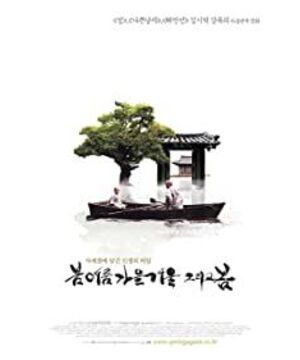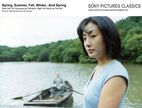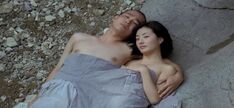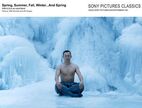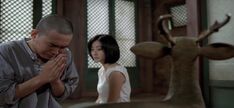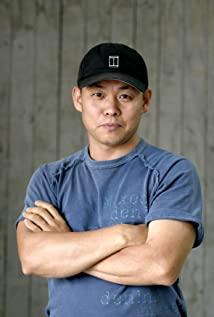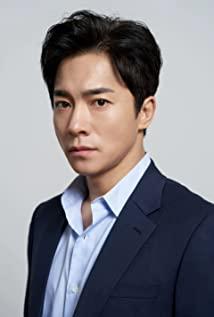The drama I am most obsessed with is "Spring, Summer, Autumn, Winter and Spring". In fact, what attracted me was the concrete expression of his understanding of "reincarnation" in his thoughts.
The story unfolds directly. The old monk and the young monk live in a paradise dependent on each other. It can be seen that the old monk is also a person who once had a story. But it never mentioned what happened to make him live alone outside the secular world. The little monk is small and carefree. Serve the Buddha with the master under the solitary lamp. It's also happy and happy. The master is not a talkative person, but always looks at the little monk and stays silent. His face was full of regret. Until another time, when the little monk was playing alone. He tied a stone to each of the fish, snake, and frog, and watched them happily dragging a cumbersome forward. There was an innocent smile on his face. The old monk severely punished the young monk after seeing it. But it was too late. Snakes and frogs have been dragged to death by the stones. The little monk held the corpse of the frog and the snake but kept crying. The old monk sighed and said, "The stone you tied to them is not the stone of your own soul." The story laid the groundwork in this Zen machine.
The days watched as the day went flat and passed. The little monk grows up, and the old monk gets older. But the peace will always be broken, and the time that should come will always come. An urban woman who came to the temple to repay her promise finally attracted the little monk, and they had a relationship easily. For urban women, everything may be just an encounter on a journey in life. But for the little monk, it did open up another world. From then on he was not willing to be lonely anymore. Want to escape from now on. There is no tree in Bodhi and the mirror is not the place where there is nothing stained with dust. Since the mirror stage is stained with dust, it is no longer as clear and translucent as it used to be. Finally one day he went out, not so much as a walk, but as a flee, to escape from this "haven paradise". The old monk knew everything, but he didn't know what he did and didn't ask. Just sighed. Maybe everything has a foreboding long ago. The report will be returned after all. It's just that the old monk spends more time in front of the Buddha, as if there is nothing in the world except the Buddha.
The little monk finally returned. At that time, he was no longer a monk. He killed the woman who had pledged each other with him. He felt that no matter how big the world was, he seemed to have no place for him. He came back. The old monk didn't say anything, looking at the little monk, it was like watching him tie a stone to those little animals. Everything is actually retribution, and the stone of the soul eventually dragged down the little monk.
So everything seems to be logical. In prison, and out of prison. At that time, the little monk had passed the unconquerable years. Go back to the temple that has been vacant for many years. The old monk has been sitting down for many years. He suddenly understood the old monk's agony, the sadness of the old monk when he silently chanted sutras to the Buddha. As a result, he seemed to have turned into the old monk back then.
Everything seemed like reincarnation. In the middle of winter, a woman sent her child to the temple. She said nothing but the old monk accepted it. He seemed to have been waiting for this child.
At the end of the story, the little monk played alone, stuffed a small stone into the mouths of fish, snakes, and frogs, smiling and watching them run away with difficulty. There was a pure smile on his face. Behind him, the old monk silently watched him finish all this without saying anything. Thoughts may have returned to the past.
In Buddhism, there is a saying of reincarnation, the so-called seed industry results in karma. Kim Kidd’s performance in this film is vivid and vivid, and this philosophy of reincarnation is most prominent in this film. There is also a slight interspersed in "Recipient Unknown". But it's just a sweep away. "Recipient Unknown" focuses more on the contradiction between people. It’s not shown here, but in "Sad Dreams", Kim Kidd seems to have thrown his own religious philosophy out of his mind. The content gradually got a little out of control, and he had to organize it in just one hundred minutes. Even if Kim Kidd felt powerless. NS. More and more "metaphysics". But many of these elements are something I like very much, but I really didn’t understand this movie. I saw some small details and found it very interesting. The whole story is dull and boring.
There is also a movie, "Empty House". The feeling of this movie is "ethereal". There is very little dialogue, even very little lust (erotic is a part of Kim Kidd’s movies that cannot be ignored, and even many people see his movies as erotic films), everything is beautiful utopian. In fact, "Spring, Summer, Autumn, Winter, Another Spring" also has this kind of ethereal, but it is more in the landscape. The beautiful environment really seems like a paradise. The etherealness of "Empty House." is expressed between people, as if the whole story is so aura. Beautiful and fascinating. There is no need to talk too much between the hero and the protagonist, and love is based purely on the spirit of Plato.
When it comes to Kim Ki-de’s movie, one topic that cannot be avoided is "abuse". In "Recipient Unknown", the mother finally ate the body of her son. The young girl in "The Samaritan Girl" jumped off from a height with a smile. In "Room of Drifting Desire", the piercing screams made by the woman who stuck her fish hook into her vagina and then violently pulled it out were enough to make people shudder. Lu Xun said that tragedy is to destroy beautiful things for others to see. Kim Kidd may also have such a hobby. But he is more to show his inner fear. And his "abuse" is rarely an everlasting theme that runs through the movie. Through such "abuse" to show the cruelty between people, or the oppression of people by society. And my distrust of reality and even my loss of people are completely shown in the movie.
However, I personally don't like this kind of abuse. It's not bad. I watched a lot of Von Trier's "abuse" movies when I got up early and liked it, but now I can't take any interest in it anymore. And I always feel that when I saw the end, it seemed to be stuck in a dead end. The content seemed to be familiar and the intention was the same. Jin Ji-de kept repeating himself. Fortunately, he also found out. "This subversive movie. Of course, all of this has nothing to do with his "abuse", it's just a breakthrough for himself. One breaks and then stands.
Kim Ki-duk is one of the top directors in Korea. His thinking about human nature is profound, serious and thought-provoking. Not only applies to South Korea, but we can also find that morbid state in our citizens, so that we can prevent it before it happens.
View more about Spring, Summer, Fall, Winter... and Spring reviews


